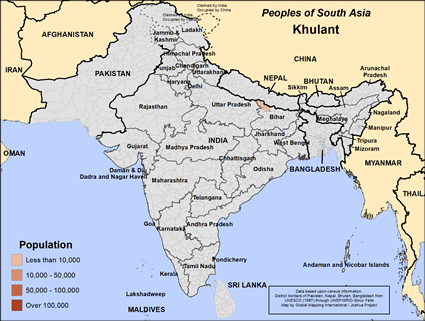The Hindu Khulant people live in northern India, primarily in the foothills of the Himalayas. Historically, they have engaged in agriculture, relying on the region's fertile land and seasonal monsoons to grow crops. Over time, they have maintained their agricultural practices while adapting to economic changes in the region. Many Khulant families still farm, but some have diversified into small businesses or migrated to nearby towns for work.
The Khulant people live in rural villages where agriculture serves as the backbone of their livelihood. They grow crops such as wheat, rice, and vegetables, working the land using traditional farming methods. Families often collaborate in both farming and household tasks, with men primarily handling fieldwork and women managing domestic responsibilities. Livestock, such as cattle and goats, play an essential role in supplementing their income and providing food.
Villages consist of homes made from locally sourced materials such as mud and brick. Daily life revolves around farming, family, and religious practices. In recent years, some younger members of the Khulant community have moved to urban areas in search of better employment and educational opportunities.
The Khulant people practice Hinduism, which plays a central role in their lives. They worship deities like Vishnu, Shiva, and Durga, and participate in religious festivals such as Diwali, Holi, and Navratri. Temples and local shrines serve as gathering places for worship, prayer, and community events.
The Khulant people also follow traditional rituals tied to agriculture, offering prayers for rain and good harvests. Religious practices and festivals are deeply connected to their agricultural cycles, reinforcing the importance of the land in their daily lives.
The Khulant people face several challenges, including limited access to modern agricultural techniques, healthcare and education. Their dependence on traditional farming methods makes them vulnerable to changes in weather patterns, which can severely impact crop yields. Access to improved irrigation systems, modern farming tools, and sustainable agricultural practices would help stabilize their livelihoods.
Education remains a critical need, as many children in Khulant villages have limited access to quality schools. Expanding educational opportunities would allow younger generations to explore alternative career paths and improve their economic situation. Healthcare services are also insufficient, with many families traveling long distances to reach medical facilities. Programs aimed at improving healthcare access and education would benefit the Khulant people.
Pray for the lives and culture of the Khulant people to evidence the rule and reign of the Kingdom of God as they open to the gospel, and for the beauty of Jesus to be seen in them.
Pray for a "Book of Acts" type of movement to Christ among the Khulant people.
Pray for the Khulant people to understand and embrace that Jesus wants to bless their families and neighborhoods.
Pray for Holy Spirit anointed believers from the Khulant people to change their society from within.
Pray for a movement in which the Holy Spirit leads and empowers disciples to make more disciples.
Scripture Prayers for the Khulant in India.
Ethnologue: Languages of the World
Reports from Indian NGOs on rural communities in northern India
Academic research on agriculture and rural development in the Himalayan region
| Profile Source: Joshua Project |











